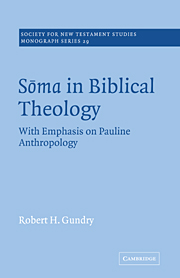Book contents
- Frontmatter
- Contents
- Acknowledgements
- Abbreviations
- PART I FOR AND AGAINST A HOLISTIC DEFINITION OF SŌMA
- 1 Sōma as the whole person: the rise of a definition
- 2 Sōma in extra-Biblical literature
- 3 Sōma in the LXX
- 4 Sōma in the NT outside Pauline literature
- 5 The alternation of Sōma with personal pronouns in Pauline literature
- 6 Sōma elsewere in Pauline literature
- 7 Sōma in I Cor 6: 12–20
- PART II SŌMA IN THE FRAMEWORK OF ANTHROPOLOGICAL DUALITY
- PART III THE THEOLOGY OF SŌMA AS PHYSICAL BODY
- Select bibliography
- Index of passages cited
- Index of authors
2 - Sōma in extra-Biblical literature
Published online by Cambridge University Press: 14 January 2010
- Frontmatter
- Contents
- Acknowledgements
- Abbreviations
- PART I FOR AND AGAINST A HOLISTIC DEFINITION OF SŌMA
- 1 Sōma as the whole person: the rise of a definition
- 2 Sōma in extra-Biblical literature
- 3 Sōma in the LXX
- 4 Sōma in the NT outside Pauline literature
- 5 The alternation of Sōma with personal pronouns in Pauline literature
- 6 Sōma elsewere in Pauline literature
- 7 Sōma in I Cor 6: 12–20
- PART II SŌMA IN THE FRAMEWORK OF ANTHROPOLOGICAL DUALITY
- PART III THE THEOLOGY OF SŌMA AS PHYSICAL BODY
- Select bibliography
- Index of passages cited
- Index of authors
Summary
In passages from extra-Biblical literature sōma often receives the translation ‘person’. R. Hirzel cites a multitude of passages from the classics for such a meaning. The translations in the Loeb editions of ancient Greek writings frequently have ‘person’ for sōma. The same is true of other translations. Liddell, Scott, and Jones devote a whole paragraph to references under the meaning ‘a person, a human being’. F. Preisigke and Moulton and Milligan concur with examples of the general sense ‘person’. So also do Bauer, Arndt, and Gingrich in their lexicon and E. Schweizer in TDNT. Do these references demonstrate an accepted usage which Paul may have borrowed and developed? The references demand examination. The wideness of the range of ancient Greek literature prevents exhaustive treatment, but representative examples will afford adequate ground for judgement. And that judgement should not be predetermined by the weighty authority of those who have assigned the definition ‘person’ to these references. Passages in the following discusssion come from the lexicographers just mentioned.
We may first of all dispose of those many instances where sōma refers to slaves. As in Rev 18: 13 and Septuagintal passages yet to be examined, this use of sōma emphasizes the thingness of slaves as property and working tools. Wholeness of personality lies quite outside the scope of vision, in fact, runs contrary to it.
- Type
- Chapter
- Information
- Soma in Biblical TheologyWith Emphasis on Pauline Anthropology, pp. 9 - 15Publisher: Cambridge University PressPrint publication year: 1976



